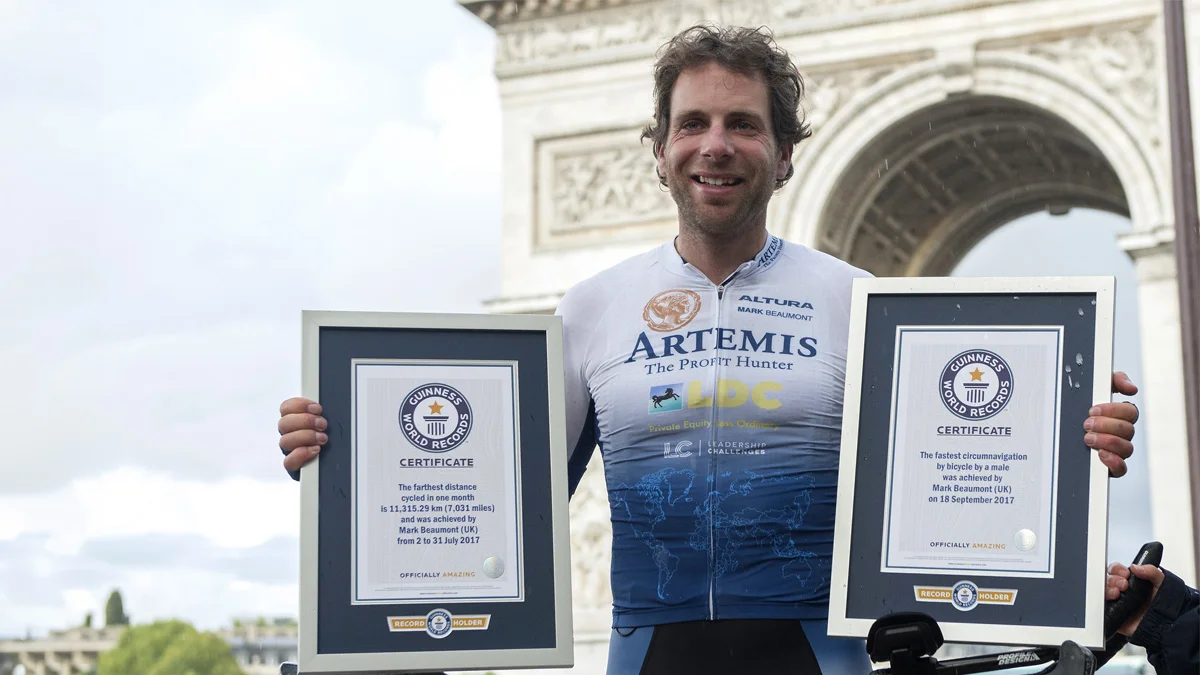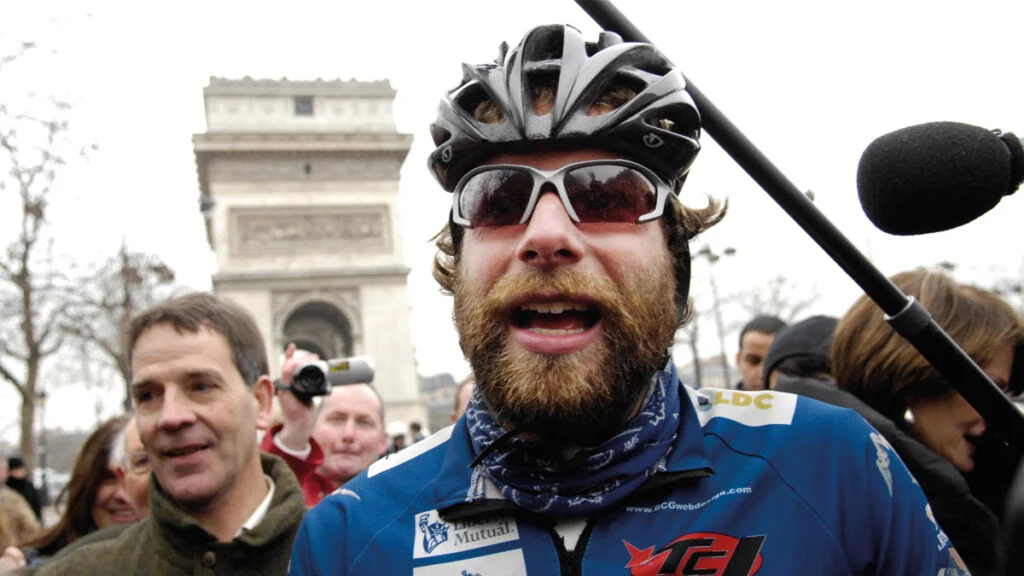
You can listen to our podcast interview with Mark Beaumont here.
Mark Beaumont has a rare but valuable gift – he can turn absurd ideas into reality. He can get things done even in the most trying circumstances.
Take this example from his childhood. When Beaumont was just 11 years old, he wanted to cycle across Scotland. For most children his age this would be a silly daydream that didn’t progress any further. But Beaumont actually did it.
Then, as a teenager, he decided he wanted to study at Harvard University in the US. So he applied, got an interview and was offered a place. The only reason he didn’t make it to Massachusetts was that his parents couldn’t afford to send him to the east coast of America. Beaumont shrugged off the disappointment and got himself a last-minute place at the University of Glasgow, despite initially being told it was too late to apply.
These early adventures were the start of something much bigger. Beaumont had noticed that the record for cycling around the world was 276 days. This, he thought, could be beaten. However, there were some problems with this idea – Beaumont was fresh out of university, had little money to fund an attempt and was not a professional cyclist. But he found a way.
Beaumont approached the BBC about making a documentary about his record-breaking bid and then sold sponsorship for the expedition off the back of that. He completed the 18,000-mile journey in 194 days and 17 hours.
In 2017, he went for the record again. This time he went around the world in 78 days, 14 hours and 40 minutes – more than twice as quick as his first adventure. In between the two trips, Beaumont tried to row across the Atlantic (but capsized 500 miles from the finish and had to be rescued), rowed from Canada to the magnetic North Pole and cycled the length of both Africa and the Americas, all the while making documentary films and writing books about his adventures.
His record-breaking exploits mean he has a unique perspective on what it takes to turn ideas into reality – a vital attribute for any growing business. Today Beaumont is helping companies to do just that as a venture capital investor.
Beaumont grew up on his parents’ farm in Scotland and was home-schooled until he went to secondary school. He thinks that this childhood environment is important to what came next.
“My quiet confidence to back my own ideas and not care too much about whether it was the ‘done thing’ or not goes back to those formative years. There wasn’t a class around me or a peer group to say: ‘That’s cool’ or ‘That’s not cool’,” Beaumont explains.
“If I have an idea, I tend to do it. I’m not trying to be countercultural about it. I think it comes from not interacting in a normal way in a classroom environment until I was a teenager.”
While Beaumont’s early adventures were something of a voyage into the unknown, his second attempt to cycle around the world was a logistical triumph, as well as a physical one. It was a very different adventure to his first.
It meant covering more than 240 miles every day for two and a half months. He had to cycle for 16 hours and sleep for less than five hours every day. He amassed a team of 40 people to work on the project, which took two and a half years of planning.

“We went out there with an incredibly detailed plan to break an 18,000-mile race into four-hour blocks and come home in sub-80 days,” he says. “There is nothing in the history of endurance cycling that suggests that might be possible.
“I had one job during the trip: ride the bike. Beforehand I could build the team, raise the finance and do the deals. But when it came to the actual race, I couldn’t be the leader. I had to hand over the entire project and say: ‘Right, you get me around the world, I’m just the athlete now.’ That was a real task in delegation.”
During the ride Beaumont crashed in Moscow, fracturing his elbow and breaking some teeth. But that was not the hardest part. Despite the pain of having to eat 7,000 calories a day through broken teeth and having to take painkillers to deal with the heavily strapped elbow, he thinks it gave him something to focus on.
“Believe it or not, I didn’t consider giving up at that point,” he says. “It actually gave me incredible determination. The pain and the issues from the crash throughout Russia and Mongolia were never something that gave me a reason to give up. It gave me something to focus and fight back from.”
Instead, he suggests, the most difficult aspect of any expedition is the monotony of it. “The hardest point on a big expedition is the opposite of crisis, it’s the sheer attrition of it. It’s the point when you’re two months in and it feels like Groundhog Day – it’s just this incredibly brutal routine. There’s no crisis, there’s no moment in time that threatens the whole project, it’s just the consistency,” he says.
“You need a ruthless ability to get up and execute on the plan, even when you’re going through the Midwest of the US and Canada with cracking headwinds. Everyone just thinks you’ve done it, everyone is celebrating for you. But you’re still thousands of miles from the finish. People always imagine that a crisis is what makes failure, but I think a crisis is what you fight back from. Where people give up on most big projects is just the sheer attrition of it.”
This explains a lot about how Beaumont thinks about endurance and how to get things done. He believes that a performance mindset is more important than a growth or positive mindset and has issues with some of the terminology in modern businesses that implies people always need to be positive and that tomorrow is always better than today.

“What’s the difference between a performance mindset and a positive mindset? When people say ‘Well, you just need to be positive, you just need to be focused, you just need to be driven’ – life is not like that, some days just don’t work like that. It is much better to acknowledge when a bad day is bad and a good day is good, that things go right and things go wrong.
“But the performance mindset is acknowledging that you still need to be relevant, you can’t just not get out of bed. When things are going badly, your choices, your actions, your behaviours and your body language count just as much. Encouraging myself and my team to turn up and be relevant even when they don’t want to is about performance and accountability.”
Beaumont worries that a growth mindset can hold people back from achieving what they want to. “I’m not completely against it, but it does slightly encourage the idea that you’re never good enough, that tomorrow always needs to be better than today and next year is going to be better than this year. It’s some sort of strange capitalist idea that everything is growing, everything is bigger and everything’s better. That today only exists to make tomorrow a better reality,” he says.
Beaumont recounts a story about competing in an off-road cycling race from Land’s End to John O’Groats called GBDuro. Some 60 people started the race, but only 13 finished. He admits that “blew his mind” as he questioned what happened to the other 47 people – did they not finish due to their bikes breaking?
When he looked at the 13 people who did finish, he found “no commonality”. It was not the youngest or the fittest but an “eclectic bunch”, Beaumont explains. He spoke to them all about their rides, why they were doing it and how they got through it. What he learnt was that it was more to do with the difference between what people want to do and what they are prepared to do.
“To be glib about it, 47 people at some point along that long and winding road stopped riding their bike. The road in front of them became too hard. Now you can always ride the road in front of you. But the idea of how long that road is – the bit beyond the horizon you can’t see – that is what stops people riding their bikes,” he says.
“Everyone had the dream, everyone had the ability, and everyone set out to race 2,000km. But 47 people quit. Why they quit is normally because of the psychology of just how hard reality is versus how big the dream is.”
Listen to the full interview here:
Related and recommended
The Olympic cycling champion has brought lessons from his time in sport to his work in business
How do you build a company culture that nurtures game-changing ideas? Start with mindset, feedback and failure
The auto industry entrepreneur believes smart pivots can be the start button to fire up business success
Knowing how to get agreement between two parties is key in business. Two experts who have dealt with life-and-death negotiations offer their insight

